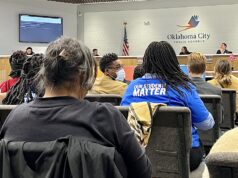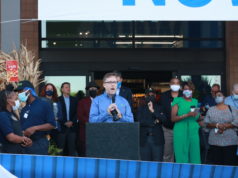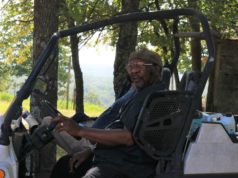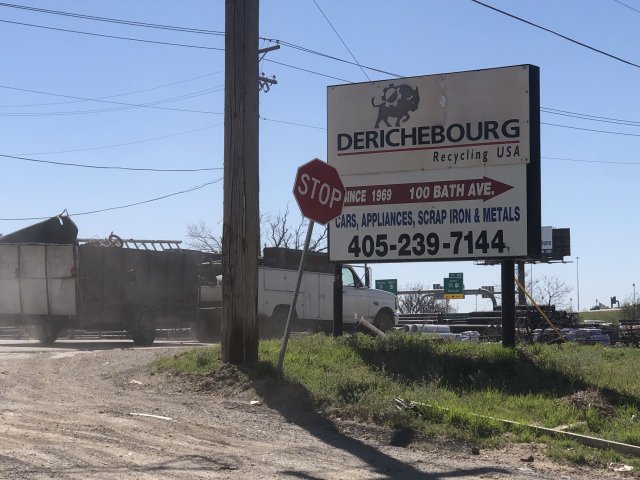
Several times a week for approximately the past decade, northeast Oklahoma City’s John F. Kennedy neighborhood has been shaken by loud booms and shock waves emanating from the nearby Derichebourg Recycling plant. The noise is highly disruptive, and some residents say it has even caused structural damage to their homes.
People in the neighborhood have been trying for years to get the city to address the problem and declare the plant a nuisance, but they say they have been met with inaction as the issue has passed from one agency to another. Residents now feel they don’t have anywhere else to turn to get the issue resolved.
“If the recycling plant was in a white area, I guarantee you that the particular white neighborhood would not allow for something like that to happen, or the recycling plant would not operate that way,” former OKC Councilman John Pettis said. “But because it is in the Black community, the recycling plant thinks they can do any and everything. And that’s unfortunate that they continue not to be good neighbors.”
‘It’s disruptive. It’s random. It’s loud. It smells. It is frightening.’
A multinational company founded in France, Derichebourg Recycling‘s main Oklahoma City location is situated in an industrial zone bordering the JFK neighborhood. The two areas are split along Northeast 4th Street between North Lottie Avenue and North Martin Luther King Avenue. The blasts that have been disturbing the neighborhood happen when propane tanks or other explosive items, such as vehicle airbags, go through the plant’s shredder machines undetected.
According to residents, severe blasts happen every couple of weeks, with milder ones in between, and can be heard and felt in the surrounding area. At one point in past years, the booms were reportedly happening daily.
Lee Roland, a pastor at The Parish in Oklahoma City and the diversity, equity and inclusion director for Epic Charter Schools, lives in the neighborhood. He called the blasts “extremely violent” and said they “will make you wake up in the mornings.”
“It’s not a ‘pop.’ It’s not like a shotgun or something like that. It’s like you’ve taken on this blow yourself with the big ones,” Roland said. “They’ve been so loud and so violent that I have been in Zoom meetings and it shook my camera.”
Some residents, including Roland, even say the booms have damaged their homes.
Roland said his home is 10 years old. He said he had repairs done to his home five years ago but damages reappeared. Roland provided photos of his and his neighbor’s homes showing damage to walls and floors.
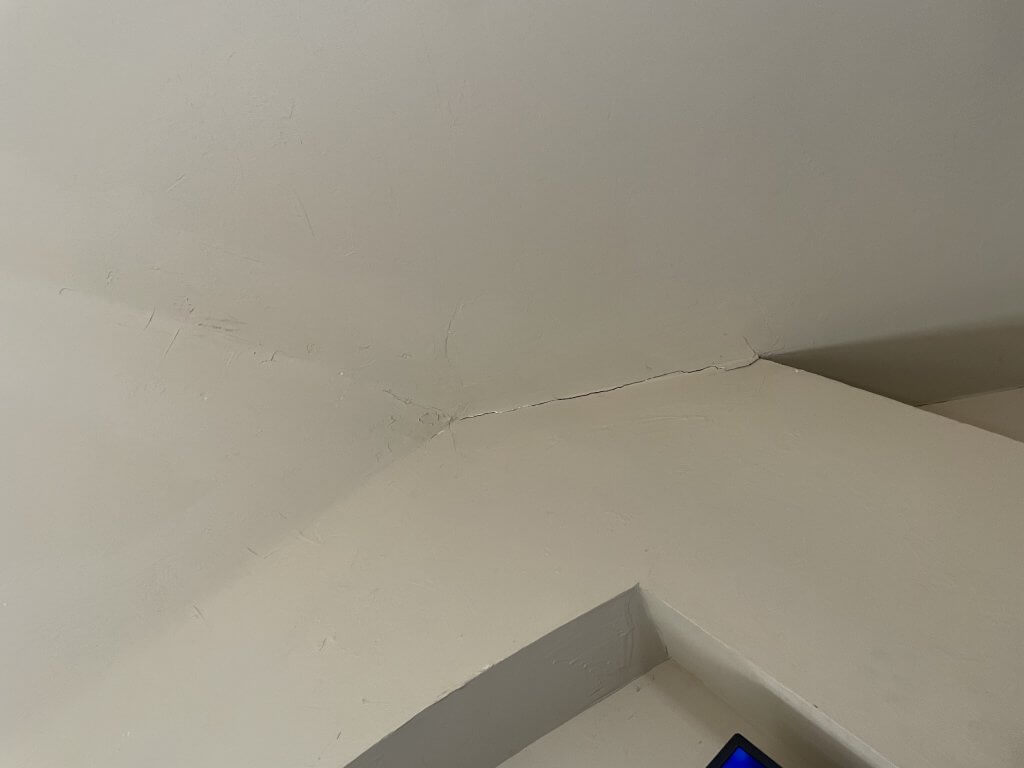
The damage cannot be definitively attributed to the blasts, and the plant has argued in the past that any damage to homes was caused by earthquakes. Roland and others are not convinced.
“There’s no comparison to the feeling. When we were having those quake issues, there was little sound. All of a sudden your house is shaking a little bit,” Roland said. “(The boom) is the sound and your home jolting. (It is) the sound and the impact from that.”
Besides the residents of the neighborhood, the blasts have also been disturbing employees of the Oklahoma City Housing Authority, which has its offices about 100 yards from the recycling plant.
Mark Gillett, executive director of OCHA, called the explosions frustrating and said they affect the employees.
“It’s disruptive. It’s random. It’s loud. It smells. It is frightening. It shakes our building,” Gillett said. “The fires that have occurred over the last couple of years have been scary. We are 100 yards away. The explosions are frustrating.”
Multiple calls and emails to general Derichebourg Recycling offices and a specifically identified contact person went unreturned over a period of weeks leading up to the publication of this story.
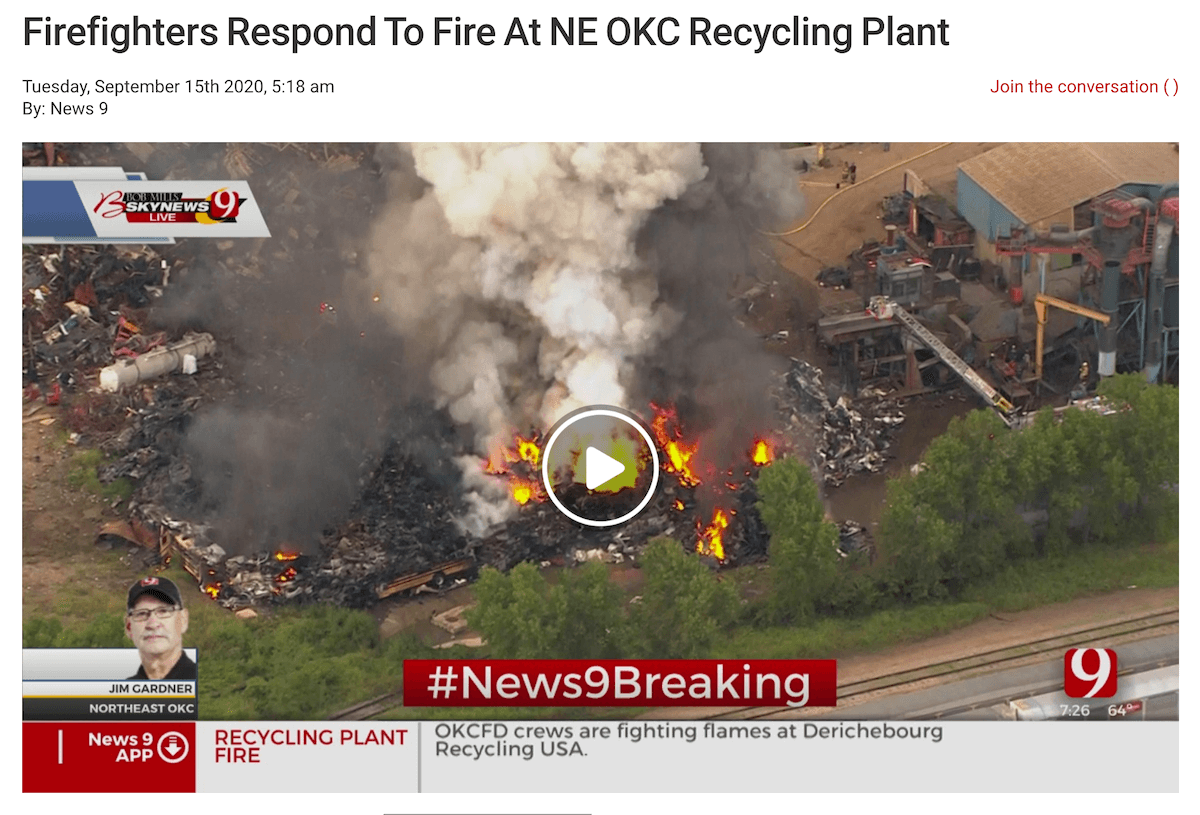
A longstanding problem
Residents have been trying to get this problem addressed for many years. In 2012, the JFK Neighborhood Association started keeping a logbook of the blasts.
In 2020, the neighborhood association logged 20 booms, according to records shared with NonDoc. The log described 15 of the booms as loud or extremely loud, enough to cause windows to shudder. This year, the neighborhood has already logged 13 booms, with five of them described as extremely loud. The rest of the explosions in the log are described as mild or medium.
In 2018, the neighborhood association produced a report that covered its own logbook records along with records kept by the Oklahoma City Housing Authority and by the plant. It also documented complaints and other attempts to stop the booms that residents had made over the years.
According to that report, the plant has not kept a full record of the incidents that have occurred. Logs show that of 204 explosions recorded by OCHA from 2016-2018, 103 were not logged by Derichebourg Recycling.
The jurisdiction shuffle
The JFK Neighborhood Association’s document (embedded below) also recounts that residents began reporting the blast incidents to Oklahoma City’s Action Center, which deals with code violations and other neighborhood problems.
In July 2018, however, after residents had been reporting explosions to the Action Center for years, the Action Center notified the neighborhood association that it had no jurisdiction in the matter.
“I’m sorry. We are aware of these booms, and unfortunately, the city does not have any codes addressing this problem,” Rhonda Massey, an Action Center representative, said in an email to Denyvetta Davis, president of the JFK Neighborhood Association. “We have no jurisdiction in this matter.”
Additionally, when the neighborhood association requested the documentation of years of reports to the Action Center, the center said it had no documentation of the issue.
“Thank you for letting us know that the City of OKC would no longer address the issues of ‘Booms’ in the JFK neighborhood,” Davis replied.
In the meantime, citizens had also tried going to the Oklahoma City Fire Marshall with their complaints.
In May 2016, Scott White from the fire marshal’s office visited with the manager of the plant about the importance of preventing future explosions and said the recycling plant “explained the precautions they take to minimize explosions,” White said in an email to Davis.
White determined that the booms coming from the plant were far too frequent and should be addressed. However, White said in a May 2018 email to Davis that he was told by the Action Center that OKC code enforcement officers do not deal with explosions reported from citizens.
“I do not understand this as it is a noise complaint issue,” White said in the email to Davis. “I have done everything within my authority that I can do to assist you and the citizens of the JFK neighborhood and it is obviously not enough. I’m sorry that I could not resolve this problem for you.”
Pettis and Roland said neighborhood residents have met with representatives from the plant and have received “partial apologies,” as the plant has argued it is operating within local code regulations.
“They are following code because, what I understand, is that you can not control the nature of the sporadic explosions,” said Gillett, the OKC Housing Authority director. “There’s no way to put that in a code.”
In response to the 2018 report, an inspection was done by the Oklahoma Department of Environmental Quality, but it did not result in significant action.
In a letter about the results of the inspection, Department of Environmental Quality employee Matthew Johnson stated that he “observed that the facility does have an active stormwater permit with the DEQ, no appearance of ‘carcinogenic pollutant’ in the air or ‘loud explosions.’”
“I did observe an occasional loud noise, but later observed it to be a front-end loader moving the recycled material around the facility’s property,” Johnson said in the letter. “No violations we observed, this complaint will be closed.”
‘We want this thing to end’
Roland said pressure exerted by the neighborhood association and others has reduced the frequency of explosions in recent years, but it’s not enough.
For now, it seems all options have been exhausted. The neighborhood continues its record-keeping and wants to make sure the wider public is aware that this problem remains unresolved.
JFK neighborhood residents are not the only ones experiencing booms coming from a Derichebourg Recyling plant. In 2012, the Houston Chronicle reported on a similar situation with recycling plants, including a Derichebourg branch, in Houston, mainly near predominantly African American and Hispanic neighborhoods.
“That’s where it goes into environmental justice — where the city, in my view, has had issues with environmental justice,” Pettis said. “When you look at the zoning of industrial property, on the unfortunate side of it is the city has allowed heavy industrial use next to neighborhoods. And that is wrong.”
Roland’s home is roughly a half-mile from the recycling plant. He said that while he has gotten used to the milder booms, the large ones are still traumatizing.
“When the young people would have the cars going ‘boom boom boom’ and with the bass sounds, well [the explosions] are that on steroids,” he said. “We want this thing to end.”
The JFK neighborhood consists primarily of middle-income and lower-income residents, including Section 8 housing authority properties.
“JFK neighborhood residents are frustrated, tired and have lost hope that this issue will be resolved,” Davis stated in the 2018 report. “We’ve talked with the Action Center, police, fire, City Council and the media. It seems that nobody is responsible and has any authority to do anything about the issue.”
JFK Neighborhood Association 2018 report
